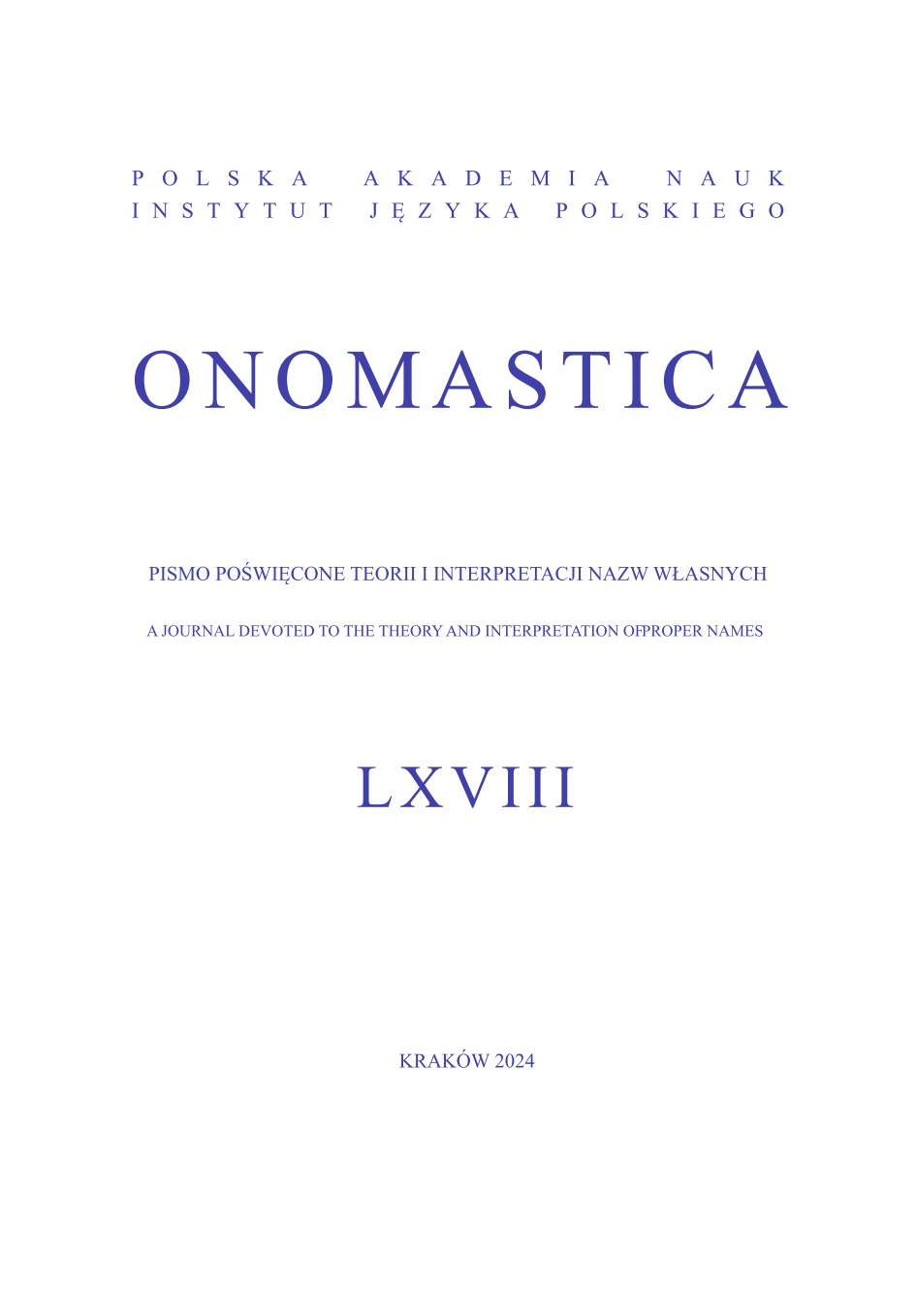Abstract
The paper presents an interpretation of urban toponymy, understood as a whole, as an emanation of the Polish cultural canon. In sociological terms, the canon of culture is a collection of topoi and characters of special significance to a given collectivity. As such, it constitutes a kind of collective memory and “common knowledge” that should be known to all participants in a given cultural community. Representations of this canon are school programs, cultural texts, anniversaries and other vehicles of memory — including commemorative naming. In this paper, the commemorative names of streets and squares will be interpreted as an emanation of the Polish cultural canon in banalized form — similarly to Billig's concept of banal nationalism. Urban names, because of their fixation in space, are reified carriers of values and memory and, by being practiced in everyday communication, they are naturalized and function as banal “reminders.” Banality of this kind paradoxically constitutes their strength. Values perpetuated in this way become elements of everyday social practices, and thus penetrate to the level of behavior without the need for forcible introduction and perpetuation — thus strengthening the national canon of culture.
References
Assman, J. (2015). Pamięć kulturowa [Cultural memory]. Warszawa: Scholar.
Azaryahu, M. (1996). The Power of Commemorative Street Names. Environment and Planning D: Society and Space, 14(3), 311–330. https://doi.org/10.1068/d140311
Bartmiński, J. (2016). Słowa klucze, kulturemy, koncepty kulturowe [Keywords, culturemes, cultural concepts]. Przegląd Humanistyczny, 3, 21–29.
Bartmiński, J., Grzeszczak, M. (2014). Jak rekonstruować kanon wartości narodowych i europejskich? [How to reconstruct the canon of national and European values?]. Etnolingwistyka, 26, 21–44.
Berg, L.D., Kearns, R.A. (2009). Naming as Norming: Race, Gender and the Identity Politics of Naming Places in Aotearoa/New Zealand. W: L.D. Berg, J. Voulteenaho (red.), Critical Toponymies. The Contested Politics of Place Naming (s. 19–51). Farnham-Burlington: Ashgate.
Billig, M. (2008). Banalny nacjonalizm [Banal nationalism], tłum. M. Sekerdej. Kraków: Znak. (Oryginalna praca opublikowana w 1995 r.).
Edensor, T. (2002). Tożsamość narodowa, kultura popularna i życie codzienne [National identity, popular culture and everyday life], tłum. A. Sadza. Kraków: Wydawnictwo Uniwersytetu Jagiellońskiego.
Dawidejt-Drobek, E. (2015). Nazwy ulic w Nysie w kontekście pamięci kulturowej [The names of streets in Nysa within the context of cultural memory]. Opole: Instytut Śląski w Opolu.
Duda, B. (2018). Miasto w świecie dyskursów [A city in the world of discourses]. Katowice: Wydawnictwo Uniwersytetu Śląskiego.
Fabiszak, M., Brzezińska, A.W. (2020). Konflikt pamięci czy konflikt władzy? Strategie językowe w dyskusji nad zmianą nazwy ulicy w Poznaniu [Conflict of memory or conflict of power? Linguistic strategies in the debate over the renaming of a street in Poznań]. Tekst i dyskurs — Text und Diskurs, 13, 81–99.
Fleischer, M. (2003). Polska symbolika kolektywna [Polish collective symbols]. Wrocław: Dolnośląska Szkoła Wyższa Edukacji TWP.
Gorter, D., Cenoz, J. (2024). A Panorama of Linguistic Landscape Studies. Bristol: Multilingual Matters.
Jastrzębski, J. (1994). Metamorfozy kanonu [Metamorphoses of the canon]. Znak, 470, 12–17.
Järlehed, J. (2017). Genre and metacultural displays: The case of street-name signs. Linguistic Landscape 3 (3), 286–305. https://doi.org/10.1075/ll.17020.jar
Kania, I. (1994). Kanon kultury: sztywna forma czy żywa treść? [Cultural canon: rigid form or live content?]. Znak, 38–44.
Kłoskowska, A. (2005). Kultury narodowe u korzeni [National cultures in their roots]. Warszawa: PWN.
Kurczewska, J. (2000). Kanon kultury narodowej [Canon of national culture]. W: J. Kurczewska (red.), Kultura narodowa i polityka (s. 25–63). Warszawa: Oficyna Naukowa.
Kurczewska, J. (2002). Patriotyzm(y) polskich polityków [Patriotism(s) of the Polish politicians]. Warszawa: Instytut Filozofii i Socjologii PAN.
Kwiatkowski, P.T. (2008). Pamięć zbiorowa społeczeństwa polskiego w okresie transformacji [Collective memory of the Polish society in the period of transformation]. Warszawa: Scholar.
Malicki, K. (2018). Kanony historyczne polskiej młodzieży. Zmiana czy kontynuacja? [Historical canons of the Polish youth. Change or stagnation?]. W: Z. Bogumił, A. Szpociński (red.), Stare i nowe tendencje w obszarze pamięci społecznej (s. 55–76). Warszawa: Scholar.
Miłosz, C. (1994). Kanon, ale czyj? [The canon, but whose?]. Znak, 470, 50–52.
Myszka, A. (2018). Pamiątkowe nazwy ulic — rozważania terminologiczne [Commemorative names of streets — a deliberation on terminology]. Onomastica, 62, 113–128.
Nagórko, A., Łaziński, M., Burkhardt , H. (2004). Dystynktywny słownik synonimów [Distinctive dictionary of synonyms]. Kraków: Universitas.
Nora, P. (2022). Między pamięcią a miejscem [Between memory and place] (J. M. Kłoczowski, tłum.). Gdańsk: słowo/obraz terytoria.
Pisarek, W. (2002). Polskie słowa sztandarowe i ich publiczność [Polish flag words and their audiences]. Kraków: Universitas.
Rak, M., (2015). Kulturemy podhalańskie [The Podhale culturemes]. Kraków: Wydawnictwo Uniwersytetu Jagiellońskiego.
Rutkowski, M., Skowronek, K. (2020). Onomastyczna analiza dyskursu [Onomnastic discourse analysis]. Kraków: Akademia Górniczo-Hutnicza im. Stanisława Staszica.
Scollon, R., Scollon, S.W. (2003). Discourses in place: Language in the material world. London: Routledge.
Szacka, B. (2006). Czas przeszły, pamięć, mit [Past time, memory, and the myth]. Warszawa: Scholar.
Szpociński, A. (2021). Współczesna kultura historyczna i jej przemiany [Contemporary historical culture and its changes]. Warszawa: Scholar.
Wierzbicka, A. (2007). Słowa klucze. Różne języki, różne kultury [Key words. Various languages, various cultures]. Warszawa: Wydawnictwa Uniwersytetu Warszawskiego.
Zarzycka, G. (2019). Kulturemy polskie — punkty widzenia, techniki ich wydobywania i negocjowania. Stosowanie perspektywy etnolingwistycznej w glottodydaktyce polonistycznej [Polish culturemes — points of view, techniques of their extraction and negotiation. Application of ethnolinguistic perspective in Polish language glottodidactics]. Acta Universitatis Lodziensis. Kształcenie Polonistyczne Cudzoziemców, 26, 425–441. https://doi.org/10.18778/0860-6587.26.29


